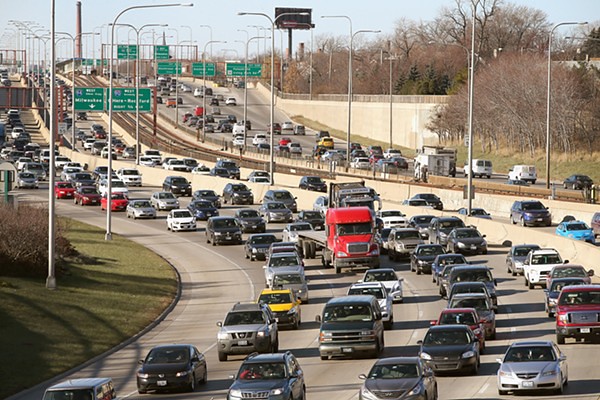[Last year the Chicago Reader launched a weekly transportation column written by Streetsblog Chicago editor John Greenfield. We syndicate a portion of the column on Streetsblog after it comes out online; you can read the remainder on the Reader’s website or in print.]
One of the TV ads put out to promote the Safe Roads Amendment is downright terrifying.
"Thousands of bridges crumbling," says the ominous-sounding narrator over grim footage of crumbling viaducts and potholed streets. "Roads in dangerous disrepair. We already pay to make them safe, but year after year Springfield raids the road fund for their pet projects." On the screen is a horrific image of the 2007 Minneapolis Interstate 35W bridge collapse, which killed 13 people and injured 145. "It's not a matter of if disaster will strike," the narrator warns gloomily, "but when."
The proposed amendment to the Illinois constitution, which will be on the November 8 ballot, would require that all funds collected through gas taxes, tolls, driver's license fees, and city stickers be captured in a "lockbox" to prevent them from being used for nontransportation purposes. The ballot question asks citizens if they support earmarking this revenue for "administering laws related to vehicles and transportation, costs for construction, reconstruction, maintenance, repair, and betterment of public highways, roads, streets, bridges, mass transit, intercity passenger rail, ports, airports, or other forms of transportation, and other statutory highway purposes."
It's no surprise that the binding referendum, which will pass only if 60 percent of voters support it, is mainly backed by the road-building industry, organized labor, and other entities that stand to profit if more money is funneled toward highway construction. The lobbying groupCitizens to Protect Transportation Funding has raised $3.7 million in support of the measure—including $1 million from the Fight Back Fund, a political advocacy group headed by labor leader Marc Poulos that isn't required to disclose its donors—and has already purchased some $1 million worth of TV ads.
Both the Tribune and the Sun-Times have urged readers to vote no on the measure, arguing that the campaign is fueled by cronyism, and that politicians shouldn't need a constitutional amendment to force them into fiscal discipline. In September the Tribune ran an editorial blasting the amendment as "diabolical," asserting that it would serve as a gravy train for the contractors and unions who make campaign donations to politicians.
"Nobody would be talking about lockboxes if our pathetic Legislature and governor would only come to terms on a new state budget that responsibly balances spending and revenue overall," read a May Sun-Times editorial. "No one doubts that transportation projects are in a sorry state in Illinois. . . . But the solution is a budget, not a shell game."
The Tribune also argued that it would be bad to eliminate the option of using transportation money for other needs in case of real funding emergencies. Wisconsin, Maryland, and California, the three other states that have passed similar amendments, included a "safety valve" that eases the restriction in the event of a natural disaster or financial crisis.
On the other side, Chicago's three most prominent sustainable-transportation advocacy groups have previously endorsed the amendment, although one of them has since reversed its position. (More on that in a minute.) The Metropolitan Planning Council is one of the referendum's official supporters, and the Active Transportation Alliance and the Center for Neighborhood Technology previously voiced their approval. They've argued that the lockbox would help grow the overall state transportation budget, including the relatively small portion that goes toward public transit, walking, and biking projects.
"The lockbox is one part of solving Illinois' transportation investment needs," said MPC spokeswoman Mandy Burrell in a statement. "Our [transportation infrastructure is] suffering from a chronic lack of investment." The civic group projects that an additional $43 billion is needed over the next ten years to get our state's transportation infrastructure in good shape again, and Burrell argued that the amendment would help bolster political support for new revenue sources for the purpose, such as a hike in the state gas tax, which has been stuck at 19 cents a gallon since 1991. "We need to ensure people that the money they pay in transportation user fees will actually support transportation," she said.





